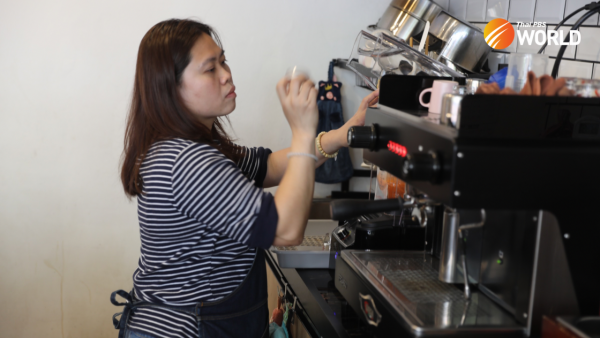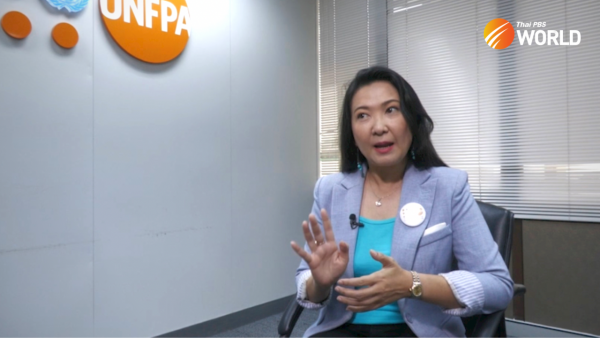“How did I know that I was pregnant? I knew it because I had missed my period but, then I was just a kid, I thought it was probably delayed. Finally, I found out after three months of pregnancy after seeing a doctor at a hospital.”
Maneerat got pregnant with her first child when she was only 17. As a result, she did not complete her education and was pushed into adulthood when she was not ready.
Her unplanned pregnancy has changed her life forever. Looking back, there was also mounting pressure that pushed her to this turning point.
“It was like when you’re squeezing something too hard, it trickles through your fingers. Can you imagine? I was just like that.”
-Being a teen mom-
It all started with her own family. Due to traditional upbringings, where females are taught to be reserved and not to mingle with men, Maneerat was not allowed to have a friend of the opposite sex. Once they found out, her parents forced her to drop out of school, so that they could keep her away from seeing her boyfriend.
Forbidden fruit is, as they say, often sweeter.
“Back then, I only wanted to have a friend of the opposite sex,” she explains. “My family was very conservative, so they didn’t accept my boyfriend at all. When they tried to stop me from talking to him, they couldn’t, so they stopped me from going to school so that I would not get to see him.”
Her controlling family pressured her to break free. Maneerat decided to move in with her boyfriend, which eventually led to her pregnancy.
In fact, women who became pregnant in their teens mostly end up being single mothers. Maneerat’s case, however, is quite exceptional and very fortunate, as her boyfriend, who eventually became her husband, helped her to raise their kids. Now they have been together for more than 30 years.
“When I found out that I was pregnant, I wondered what I would do if I had to raise my baby all by myself. I was lucky that my boyfriend is very understanding. He told his parents that I was pregnant and that I should be surrounded by adults to be safe. That was how I moved in with my boyfriend.”
Maneerat admitted that raising a baby at a very young age was extremely difficult and the biggest challenge for her as a teen mother was dealing with her own emotions.
“I was really young, so it was like a baby looking after another baby,” she said. “Back then, I didn’t understand what babies wanted. Babies would cry and get whiny. People around me even kept asking me why I let my baby cry like this.”

-Tackling teen pregnancies-
Unintended pregnancies among teens remain a huge concern for societies in many countries around the world. Thailand is unfortunately one of them.
Many issues have been blamed, such as inadequate sex education in schools, limited access to reproductive health services, teenagers’ curiosity about sexual relationships and, in the worst cases, falling victim to sexual violence or forced sex. Cultural norms are also stigmatising women who engage in premarital sex.
According to the latest data available from UNFPA Thailand, 56,074 pregnancies in girls aged 15-19 were recorded in 2020, which accounts for 10% of all pregnancies in that year. 1,783 pregnancies in girls aged 10-14 were also recorded, most of whom were victims of sexual assault.
UNFPA Thailand also revealed that 25% of Thai teenage mothers did not give birth to their children in their home provinces. Therefore, it is somewhat difficult to locate where most of the teen mothers are in the country, between urban or rural areas.
Overall, there’s a downward trend in teenage pregnancies in Thailand, mainly due to the enforcement of the Adolescent Pregnancy Prevention Act in 2016, which also led to a collaborative framework of six related ministries to curb teen pregnancies. The six ministries are Education, Higher Education, Public Health, Interior, Labour, and Social Development and Human Security.
On the other hand, the underlying societal issues are much more complicated.
Dr. Olarik Musigavong, a renowned specialist in women’s health and a committee member at The Medical Council of Thailand, explains that most teen mothers to whom he has spoken never thought that this would ever happen to them. One of the reasons, he noticed, is because of the way teachers often lecture students about avoiding premarital sex, which makes them feel that the topic is not closely related to them.
“They never thought that having sex would make them pregnant,” he said. “They also never think that pregnancy or raising a child is a problem, because most of the time, they are still in school and at home, so they do not understand about earning an income, or even how to take care of others. Because they don’t know, they don’t realise what they will have to endure once they get pregnant.”
As he noticed the problem, Dr. Olarik has changed his communication technique when talking to young students, along with an effective punchline that not only grabs their attention, but makes them realise the consequences of having sex in their school years.
“One thing I noticed is that when you tell your students that ‘You will have to drop out of high school when you get pregnant and you won’t be able to find a job nor earn high income’, nobody will listen to you,” he explains.
“But when I said ‘You will be dumped by your boyfriend for being pregnant’, all of the schoolgirls stared at me, wondering what I would say after that.”
Another trick is using simple questions, such as ‘What do you want to be when you grow up?’ or ‘Who is your idol?’
“Some would say they want to be footballers or doctors, knowing that they would have to study hard and practice hard in order to reach their dreams. Then I would tell them, ‘You know that getting pregnant in your teens will make you stumble on your way towards your dreams right?’ That was when they started to understand that unintended pregnancy is a real problem.”

-My body, my rights-
“We would only learn about our bodies, our organs, or the steps to pregnancies, but we didn’t learn anything else in greater detail,” Maneerat said as she recalled how sex education was taught when she was in school.
Sex education in Thai schools has always been among the first to be blamed, as many people believe that it focuses too much on the anatomy and not enough on consent. The traditional norms in Thai culture also make it hard for the topic to bediscussed openly.
Siriluck Chiengwong, Head of the Office of UNFPA Thailand explains that sex education in Thailand is not comprehensive enough, as it only focuses on teaching the human body parts and how pregnancy occurs.
“It doesn’t teach about what leads to a sexual relationship or even when you should start protecting yourself,” she said, while adding that the norms in Thai culture make teachers hesitant to reveal all the details.
When sex education is not comprehensive enough, it also leads to a lack of understanding among teenagers, particularly on the consequences of being pregnant at a young age.
Therefore, Siriluck suggests that comprehensive sex education, which covers topics such as autonomy, consent, preventing sexual violence and gender equality, should be included in Thai school curricula.
“Sex can be discussed and it must be discussed, not as in encouraging them to have sex, but providing them knowledge about how you should protect yourself when you decide to have sex, and if not, how do you say no.”
Another problem contributing to teen pregnancies is the access to sexual and reproductive health services. Despite such services improving, what remains problematic is the awareness, including accessibility and affordability for different groups of patients, and even their own rights to prevent unintended pregnancies.
“If we don’t provide them information or give enough access to reproductive health services, it all leads to unplanned pregnancies,” said Siriluck.
“Prevention is important, but how to fix the problem is just as important. If unplanned pregnancies do occur, what can we do to ensure a healthy pregnancy for these teen mothers, and how can we help them go back to school or at least secure a job to make a living?”

-Rights to education, even when pregnant-
Teen pregnancies often put their future in jeopardy, especially their education. Sadly, most pregnant students in Thailand are either expelled, or ostracised by their teachers and classmates, which eventually pressures them to drop out of school.
A new ministerial edict was issued in February this year, which bans schools from expelling pregnant students or forcing them to transfer to other educational institutes.
UNFPA Thailand agrees with this move, as education is a basic human right and having no access to education, because of their pregnancy, also means that their opportunities will be limited. A strong support system must be in place, however, to ensure that they can continue with their lives without being stigmatised.
“Nobody wants to see their family members becoming teen mothers,” said Siriluck. ‘If we have empathy, imagine if that teen mother is our daughter or our niece, would you want anyone to insult her? They all have human dignity, just like all of us.”
Despite that, there are people who are against the move, as they believe that allowing pregnant teenagers to stay in school would encourage more youngsters to engage in sex and become pregnant. Siriluck does not, however, believe that this would ever encourage such a “trend”, considering the pregnant students’ capacity to prepare for exams or school projects, compared to other students.
“If pregnant teens don’t receive a proper education, how are they going to live for the rest of their lives? What would she be doing for a living?” Siriluck asks of those opposing pregnant teens going back to school.
“What the ministerial edict is giving is the basic right to education, so I don’t believe that it would set the trend of increasing numbers of pregnant teens in schools.”
School students in Thailand can no longer be expelled if pregnant
Though the ministerial edict is there to ensure their fundamental rights, Dr. Olarik’s concern is how schools put them into practice. Drawing from his experience counselling pregnant schoolgirls, he says some of them felt that school is not a happy place for them from the beginning. Once they got pregnant, they became a target for shaming by their teachers and peers, which eventually pressured them into quitting their studies.
“But some schools do have great teachers and classmates who are very supportive of pregnant students,” said Dr. Olarik. “So, I want to see schools that give pregnant students another chance. Even though teen pregnancy makes them stumble in their life, it’s not the end of the world, but everyone needs to be supportive and help them get back on track.”
While the women’s health specialist emphasises the importance of education, another thing that nobody wants to see is teen mothers or their offspring ending up committing crimes, or falling victims to drug abuse or prostitution when they grow up, only because they miss out on their education or lack proper upbringings. Therefore, Dr. Olarik believes that families play a tremendous role in providing love and care for their children, so that they grow up into good citizens.
“Teen pregnancies are just the tip of an iceberg,” said Dr. Olarik. “I think what we really need to consider the most are the effects on society. When it comes to teen pregnancies, or when children are born into broken families, it will cause more problems; where domestic violence, drug abuse and crimes often follow. This is because those children often lacka proper upbringing.”
Though unintended pregnancy among teenagers is a complicated problem, Siriluck believes that a multi-track solution is probably the best way to fix it. Aside from the preventive measures, we also need to eliminate the social stigma of pregnant teens, provide positive emotional support and encourage them to continue with their education.
“Just to be clear, we do not encourage unplanned teenage pregnancies,” Siriluck explains, “but, if it does happen, families, schools and society must give them another chance, understand them and allow them to start over again.”
Teenage pregnancy is bad, but lack of support system is worse
-The only regret-
Maneerat’s experience as a teen mother can serve as a lesson for many people. At the very least, it has made an impact in the way she raises her children, especially regardingrelationships.
Maneerat, who is now 48 years old, tells her own story to her children, particularly how she ended up being pregnant at 17, while trying to incorporate conservative teachings with the modern ways of thinking.
“When my daughter was younger, I would teach her how to ‘reserve’ herself and be careful of being touched by others,” she explains.
“Once she entered her teens, I would tell her not to meet up with anyone alone at places that are out of sight. When she was in her final years of high school, I knew that I wouldn’t be able to stop her [from being in a relationship], but I would remind her not to end up like me. Luckily, my daughter understood my point. Now that she’s grown up, I would remind her that I can’t be with her 24/7, so she has to use her own judgment, and whatever she does, she will have to bear the consequences.”
When asked what Maneerat regrets the most, the definite answer is not being able to complete her education.
“If I could really go back in time, I would go back and finish school because, nowadays, if you want to become a business owner, you need an educational degree. It’s not like in the old days where you could do any kind of business without it.”
By Nad Bunnag and Jeerapa Boonyatus, Thai PBS World

IL PRIMO ECOMMERCE SPECIALIZZATO IN DELIZIE AL TARTUFO E CAVIALE – CAVIAREAT.COM
